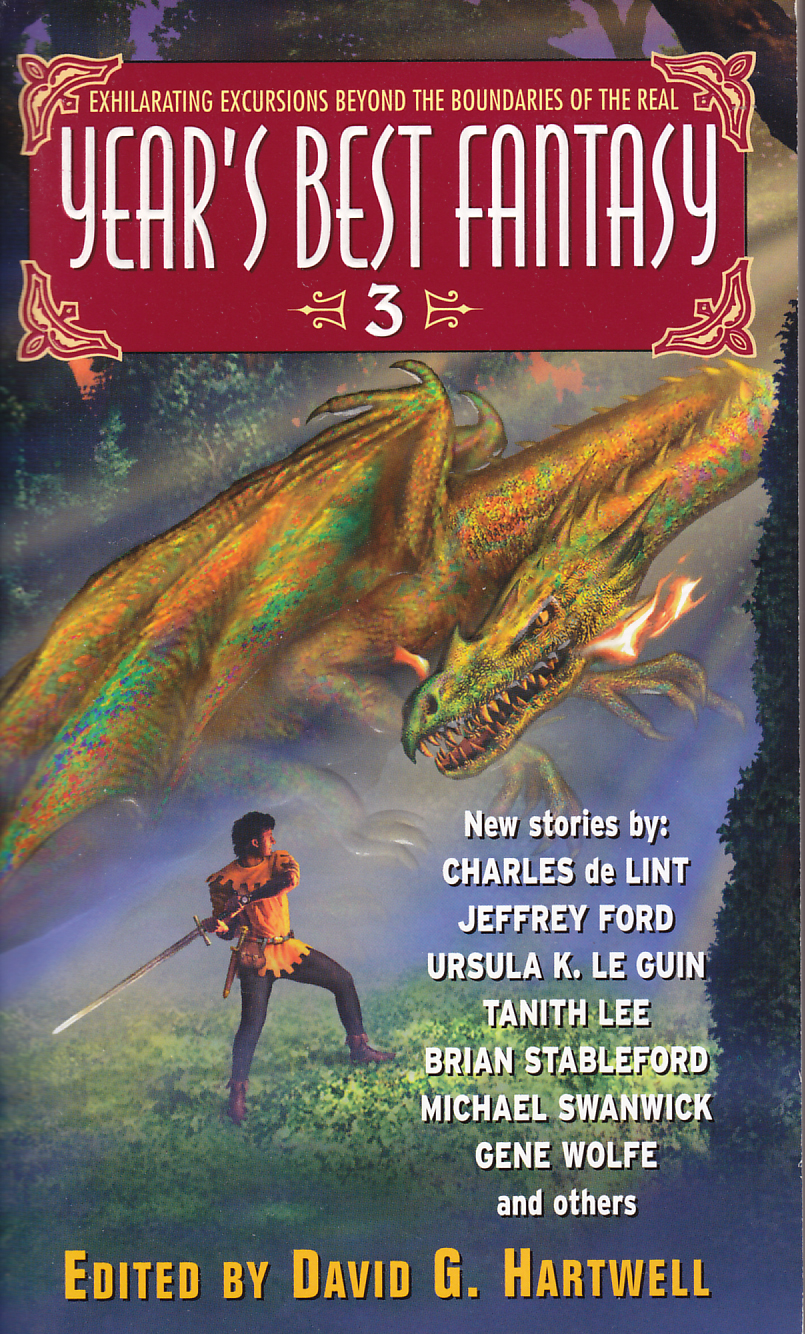Liz Williams
Books: Fantasy | Mystery | Science Fiction
Detective Inspector Chen: Snake Agent (2005), The Demon and the City (2006), Precious Dragon (2007), The Shadow Pavilion (2009), The Iron Khan (2010)
Year's Best Fantasy 3 (2003), The Banquet of the Lords of Night & Other Stories (2004), A Glass of Shadow (2011)
Snake Agent (2005)
 When I purchased this book I thought it was a mystery, after all, it's "A Detective Inspector Chen Novel." And since I bought the book on-line, I couldn't see the cover clearly, so that didn't tell me anything either. I just knew it had come up as recommended for me, and had pretty decent ratings that I saw, so I was willing to take a chance.
When I purchased this book I thought it was a mystery, after all, it's "A Detective Inspector Chen Novel." And since I bought the book on-line, I couldn't see the cover clearly, so that didn't tell me anything either. I just knew it had come up as recommended for me, and had pretty decent ratings that I saw, so I was willing to take a chance.
Thus I was surprised when I got the book and saw the cover. A mystery yes, but also a supernatural fantasy.
Which was fine. Because I like supernatural mysteries. Lucky for me, it turned out more than fine--it was really quite good.
Detective Inspector Chen is a Snake Agent--a detective in charge of investigations that involve the supernatural. He works for the police department in Singapore Three, where although his supervisor appreciates his work, he colleagues are more than a little uncomfortable with him. Additionally, he has worries at him, and his Goddess seems to have turned her back on him, leaving him to fend for himself as he attempts to solve the latest mess to cross his desk.
I liked many different things about Snake Agent. First and foremost, I liked Detective Inspector Chen. He doesn't have any easy time of things, and he keeps doing what he believes to be right, even if that doesn't jibe with what his Goddess wants.
Of the secondary characters, I liked Zhu Irzh and the Badger. Although Zhu Irzh is a demon, he's not really evil. He has a demonic nature, but aside from looks, many of the demons seem to be little different from most humans. And the Badger--well, that reminded me of multiple things, none of which I can place right now. I feel an urge to go back and re-read Chinese mythology and folklore to see if I can remember what it is about badgers.
The world building was also good. The world is just enough like ours to be familiar, yet still different, and being set in China made it seem even more exotic (at least to me.) Because we're mostly on familiar territory, we learn bits and pieces about what is different in the world was we move through the story.
There was, I suppose, a strong element of horror to the story--at least as the demonic realms were described--but it wasn't the type of horror that bothered me, which would be the scary kind. (I absolutely positively hate to be scared.) Things were gruesome, but gruesome doesn't particularly bother me when I'm reading about it. Would I want to actually see the things described? Absolutely not. But reading about them doesn't bother me in the slightest. So there's your alert if you don't like gruesome.
Because this is a mystery as much as a fantasy, there remains plenty of opportunity for continuing the series, while allowing this book to have a complete story arc. I have to admit I think this is one of the reason I am so fond of supernatural mysteries--they're typically good at closing a story arc in a single book, which keeping the opportunity for sequels wide open. I'm not sure what is is, but I seem to have little patience right now for long series that go on and on with little or no resolution.
But as I said, the Snake Agent is not an epic saga book, so you can feel free to pick up and knowing that the story will be finished at the end of the book, yet there remain endless possibilities for more stories about Chen.
My only complaint is that I found parts of the mystery rather confusing. There were some steps that didn't make a lot of sense to me, and were not explained to my satisfaction.
I do not understand how the young women in the bioweb were killed and their souls harvested. First it sounded like a plague, then it sounded like they were killed by demons directly. The plague seemed to make sense in the context of the story. The women being killed and drained of blood directly by demons didn't make a lot of sense. How would that not have caused a ton of trouble? How would they have expected to have gotten away with that? It just seemed inconsistent with everything else.
END SPOILER
If you like supernatural mysteries, then you should enjoy Snake Agent. I believe that I am going to place the paperback version of the next book in the series on pre-order.
Cover by Jon Foster
Publisher: Night Shade Books
- February 2007 | Rating: 7/10
- December 2013 | Rating: 8.5/10
- September 2019 | Rating: 8/10
The Demon and the City (2006)
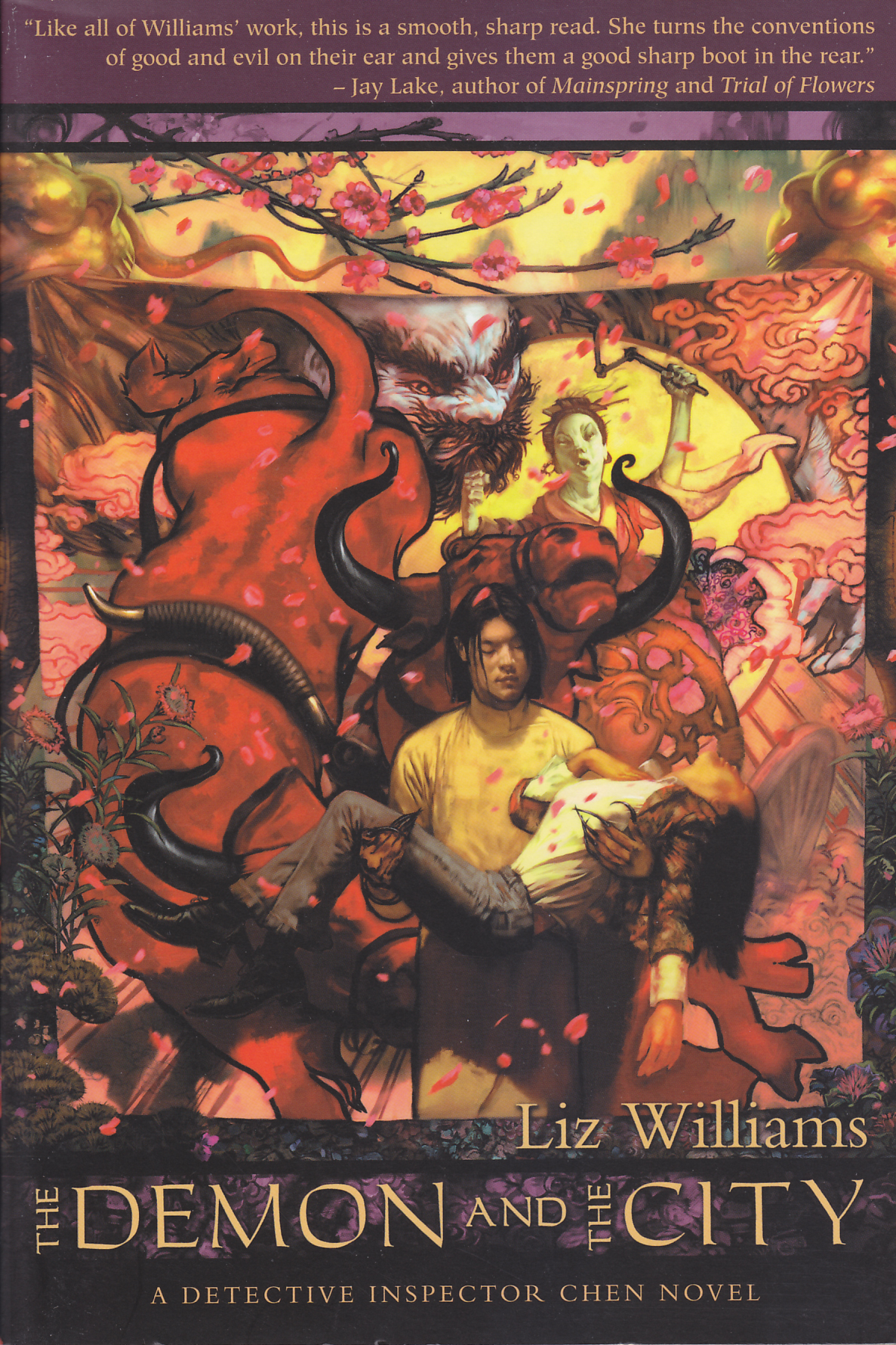 After reading The Snake Agent, I've been looking forward the reading the next Detective Inspector Chen book. (In fact, the paperback edition has been on pre-order for several months.) As with many authors I like, after getting a book, I'm hesitant to read it, for fear that it may not live up to my expectations. I didn't have to worry about The Demon and the City--it lived up to my expectations and was thoroughly enjoyable.
After reading The Snake Agent, I've been looking forward the reading the next Detective Inspector Chen book. (In fact, the paperback edition has been on pre-order for several months.) As with many authors I like, after getting a book, I'm hesitant to read it, for fear that it may not live up to my expectations. I didn't have to worry about The Demon and the City--it lived up to my expectations and was thoroughly enjoyable.
Detective Inspector Chen and his wife are on a well-earned vacation in Hawaii, so Sargent Ma and Zhu Irzh Seneschal are left to hold down the department--and suffer the displeasure of Captain Sung, who would like nothing better than to send Zhu Irzh back to Hell where he belongs. But the discovery of a mutilated body picks up Zhu Irzh's week--the highlight of which previously had been revoking the license of a feng shui practitioner.
Although this is a Detective Inspector Chen novel, the point of view is split between the demon Zhu Irzh and the other individuals involved in the mystery. In fact, Chen remains out of the scene and on vacation until nearly a third of the way into the book. Although this was a bit of a surprise, I actually enjoyed the switch from the previous book. Being a demon, Zhu Irzh has a very different view on humanity and morality than the other characters, and it was interesting to see his point of view.
As with the previous book, I loved the setting and the characters. Although there is a faint science fiction feel to Singapore Three, with the nano-technology and such, it's just a small part, and is rather fascinating, as there is seemingly only a thin line between magic and technology.
I also thoroughly enjoyed the writing.
The mystery in this book was--to me--much strong than the mystery in the previous book. Although they traverse the realms as in the previous book, I found the motives of the various individuals more clear. In particular, I liked the way that--other that Inspector Chen--no one seemed to have motives that were pure one way or another. This story was filled with shades of grey, and good and evil were definitely not clear-cut.
Although I suppose I would classify this as supernatural fantasy, it has a much different flavor than much of the other supernatural fantasy I read. There was sex, but I suppose that I'm becoming inured to it, as it seems to be a major component of most supernatural fantasies, so it didn't particularly annoy me. And it did fit in with the character's personality. The flavor of this book, however, is not one that I can easily describe. The setting is the near future, and the world is just slightly different from our own, with the seams between our world and the supernatural being much thinner than they are now.
If you're looking for something different to read, I strongly recommend The Demon and the City. You'll want to read The Snake Agent first, to better appreciate the characters of Chen and Ma and Zhu Irzh, however, if you don't, you should have no problem getting into the story.
Cover by Jon Foster
Publisher: Night Shade Books
- May 2007 | Rating: 8.5/10
- December 2013 | Rating: 8.5/10
Precious Dragon (2007)
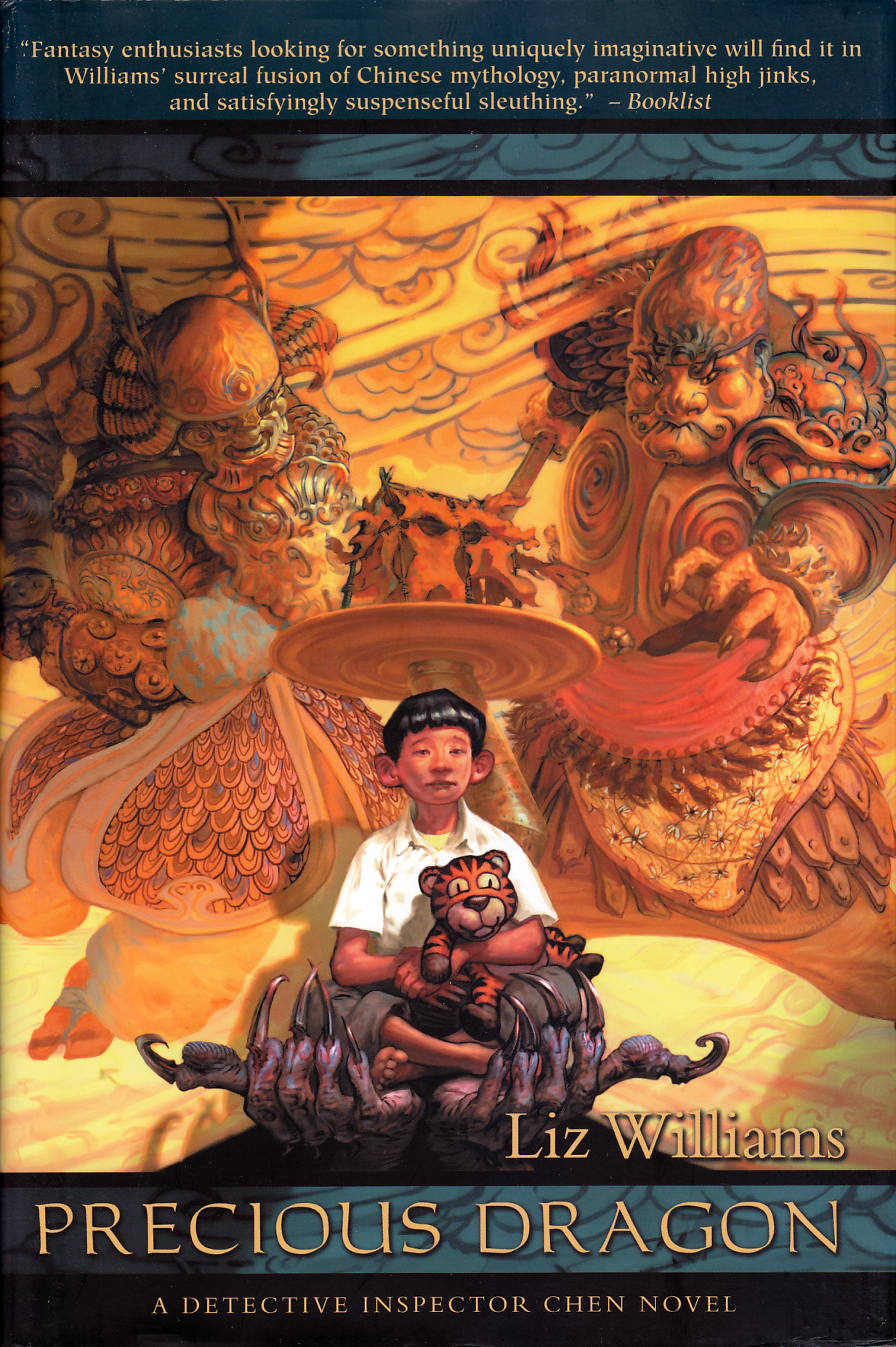 The third Detective Inspector Chen novel, it seems as if recent activities have brought Chen and Zhu Irzh to the attention of authorities, and they are charged with escorting the emissary from Heaven, Miss Qi, through Hell.
The third Detective Inspector Chen novel, it seems as if recent activities have brought Chen and Zhu Irzh to the attention of authorities, and they are charged with escorting the emissary from Heaven, Miss Qi, through Hell.
The demon grimaced. "I thought Governor Ling already had improved connections with Hell. They've been giving him kickbacks for years."
Meanwhile, an old woman arranges the marriage of her only daughter, and soon after is entrusted to care for her only grandson. And elsewhere, a teenage boy who sings in the chorus of the Opera is pulled into a mystery that tangentially involves Chen and Zhu Irzh.
By the end, everyone is involved including Chen's wife, Zhu Irzh's mother, and the Badger Teakettle, and we taken a rather thorough tour of Hell.
Although there are rather strong elements of horror in the story (particularly the time spent in the Ministry of Lust) I didn't find it particularly disturbing. Possibly because at least some of the characters treat their surroundings in such a matter-of-fact manner it was easy for me to do the same.
"Oh, come on," Zhu Irzh said.""You're a Celestial warrior, aren't you?"
"Well, yes. I am."
"So why are you pretending to be this helpless little thing?"
"It is important to be humble and modest," Miss Qi said reprovingly. Zhu Irzh looked as though he didn't even know what she meant.
The boy, Precious Dragon, is a delight.
When at last they were able to sit down, she ordered soup and noodles and bought him a fortune cookie; she had not done this for a long time. When the cookie was opened, it revealed a blank slip of paper. "Oh, what a shame," she exclaimed in disappointment, but Precious Dragon seemed quite pleased.
"It means that anything can happen," he explained kindly.
As with previous books, Precious Dragon is a complete story arc, however, this story builds upon previous stories, and it looks like future books in the series will continue to do so. You should be able to read this book without having read the previous books in the story, but as usual I recommend going back and reading the series in order.
Cover by Jon Foster
Publisher: Night Shade Books
- September 2008 | Rating: 8/10
- December 2013 | Rating: 8.5/10
The Shadow Pavilion (2009)
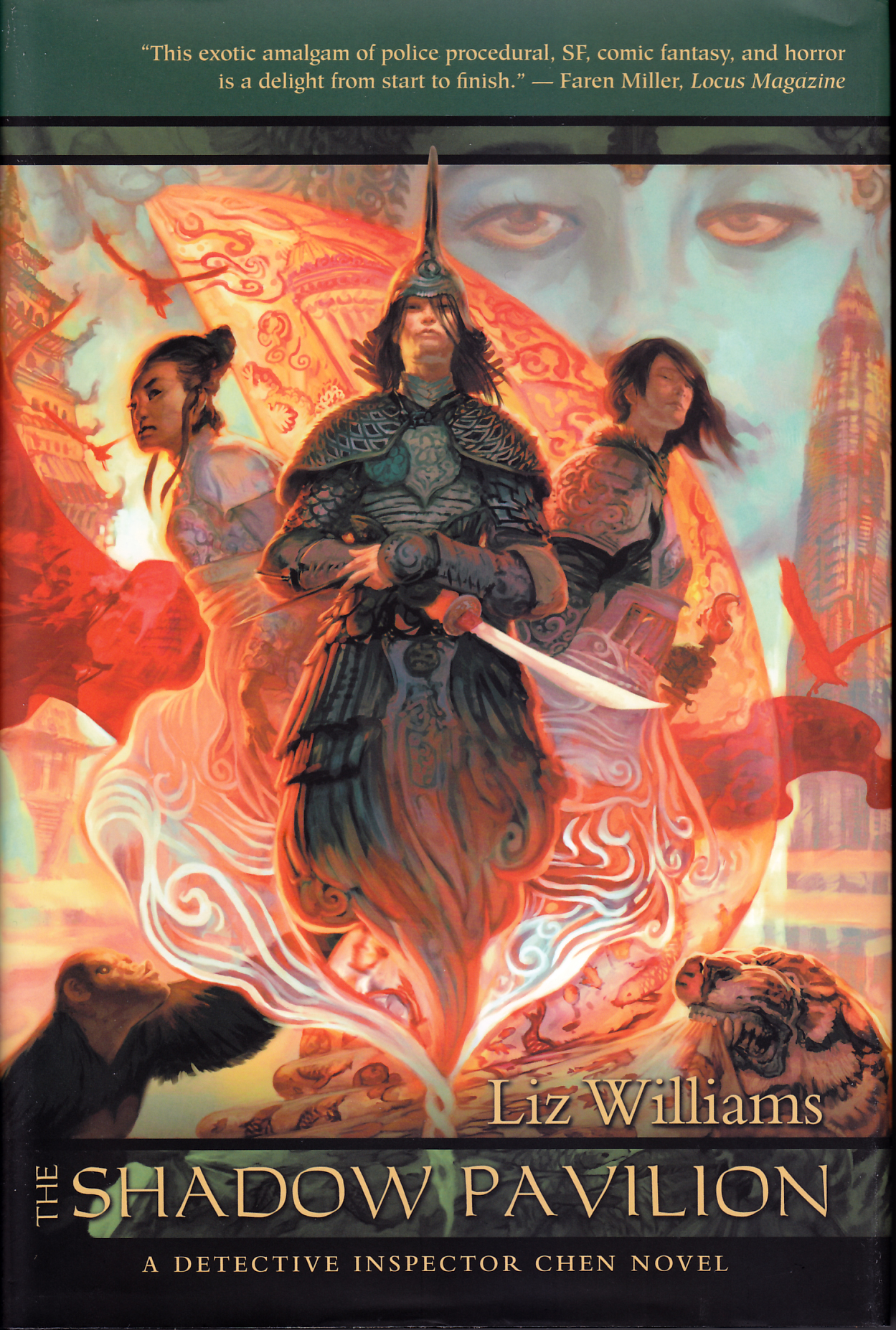 Detective Inspector Chen has multiple problems to deal with: his partner Zhu Irzh has disappeared, along with the badger, a Bollywood star/tiger demon is on the rampage, and someone wants to kill the Emperor of Heaven. Add to that the complexity of everyday life in Singapore Three, a new liaison position between Earth, Heaven, and Hell, and the fact that someone tried to kidnap his wife.
Detective Inspector Chen has multiple problems to deal with: his partner Zhu Irzh has disappeared, along with the badger, a Bollywood star/tiger demon is on the rampage, and someone wants to kill the Emperor of Heaven. Add to that the complexity of everyday life in Singapore Three, a new liaison position between Earth, Heaven, and Hell, and the fact that someone tried to kidnap his wife.
Interestingly, we spend more of the book with other characters–including the badger–than we do with Chen. We follow Go and his attempts to escape from Lara the demon tiger, we spend a good deal of time with the badger and then Zhu Irzh, as well as Inari, Chen's wife.
We spend a lot of time with Badger.
There were cockroaches, which the badger snapped up with a slight and surprising sensation of guilt: he wasn't sure that it was professional to snack on the job. Still, one had to keep up one's strength. And they were certainly tasty.
And so much more. I really adore the Badger."I was bundled into a bag," the badger said, sourly.
"Bad luck. Come to think of it, they must have been pretty good to get you."
"Thank you." The badger was grateful at this attempt to save his face. Zhu Irzh wasn't such a bad sort, really.
We actually don't spend much time in Hell in this book–at least not the Chinese Hell we saw so much of in previous books. We do spend time in Heaven, and learn about another realm, the between, where the assassin lives.
There is much for me to like about this series. First, the setting is unlike any other setting I've read, a mix of fantasy, science fiction, and Chinese folklore. Second, although the stories build upon one another, each book has a complete story arc–no cliffhanger endings here. Third, I love the writing.
Inari was wrestling with her own conscience–something that, as a demon, she is not even supposed to possess, but which may have come from that human ancestor, the ancestor who had brought such shame on their family, tainting it as she had with mortal blood. Inari had often wondered about that woman, since learning of her existence. She would be long dead, but what had happened to her soul? In Hell, presumably, since she had abandoned the Imperial Court of China and fled the shores of Earth for those of Hell. But in Hell, then where? Not Inari's own family home, that was for certain, unless–horrible thought–they had imprisoned her somewhere.
That single paragraph gives you a sense of Inari and her history, as well as the Hell from which she'd come.
This book had multiple mysteries, and, interestingly, since multiple characters were involved, multiple things happened at the same time, however, there wasn't any confusion as to who was doing what where, which I believe is a good sign.
If you have not read any Liz Williams before, you should be able to start here without difficulty, although you may find it more rewarding to start at the beginning, with The Snake Agent.
Cover by Jon Foster
Publisher: Night Shade Books
- April 2010 | Rating: 9/10
- December 2013 | Rating: 8/10
The Iron Khan (2010)
 I stumbled across The Snake Agent in 2007, and since then have eagerly bought books in the Detective Inspector Chen series whenever they came out. However, at some point finding those books was getting to be more and more difficult. Scuttlebutt has it that Night Share Books (the original publisher of the series) got itself into serious trouble, so although The Iron Khan had been listed as coming soon for ages, it never did. Then about the time I heard about Night Shade getting itself into trouble, it was listed as not available and I became even more frustrated.
I stumbled across The Snake Agent in 2007, and since then have eagerly bought books in the Detective Inspector Chen series whenever they came out. However, at some point finding those books was getting to be more and more difficult. Scuttlebutt has it that Night Share Books (the original publisher of the series) got itself into serious trouble, so although The Iron Khan had been listed as coming soon for ages, it never did. Then about the time I heard about Night Shade getting itself into trouble, it was listed as not available and I became even more frustrated.
Then, I somehow stumbled across a printing from a completely different publisher–Morrigan Books–and snatched it up. Hopefully she has sorted out her publisher issues, and I can look forward to a new Detective Inspector Chen book in a much more timely fashion.
Now, onto our story…
Chen is contacted by the Emperor of Heaven and asked to find The Book–an artifact the is akin to the blueprint for the creation of the world. Except that it's a self-aware blueprint that has decided on its own to wander off and change the world.
Zhu Irzh, Chen's sometimes partner, ends up with a task of his own: finding and stopping the Iron Khan–an unpleasant immortal. The Khan is already being chased through time by others, including the young warrior Omi, and at least one ghost.
Meanwhile, Inari–Chen's wife–is pregnant, and it looks like (aside from being half-demon and half-human) this will not be an ordinary child. The Celestial Miss Qi has been visiting Inari while Chen is gone, and it seems as if this child is already the center of attention for many people.
Confusing? It is a bit. But there is something about Liz William's writing that draws me in and ties everything together.
Unlike previous books, Chen and Zhu Irzh don't spend much time in Hell (any Hell) and I have to say I liked that change. It's not that I disliked Hell or Heaven, but Singapore Three and the world that surrounds it are such fascinating places, it's nice to spend time there. Not that we actually spend a lot of time in Singapore Three, but we do get to see more of the world in which Chen and all live.
If you have not read a previous Detective Inspector Chen book, I'm not sure this is the best introduction. Chen and Inari and Zhu Irzh (and Jhai) are somewhat settled into their lives right now, and I wonder if it would be confusing trying to understand their backgrounds AND Singapore Three AND Heaven and Hell and the Sea of Night. That's not to detract in any way from this book, it's just that there is a lot in their pasts, and a lot of world building that has gone on previously, and I'm not sure how easy a read this would be without that knowledge.
Oh, with the new publisher, a new artist is doing to covers for this series. Although I really like this cover, and although the cover does represent the story very well, somehow, the style just feels a bit off to me. I'm not saying it's not gorgeous, because it is. I'd totally pick up this book on the strength of this cover. But the style is so very different from previous books, it just feels alien to me. But that is, I fully admit, entirely my problem. And it really is a gorgeous cover. The feel just isn't what I've built up in my mind.
And now you know who I hate movies made from books so much.
Cover by Stephanie Pui-Mun Law
Published by Morrigan Books
- April 2011 | Rating: 8/10
Year's Best Fantasy 3 (2003) edited by David G. Hartwell
- "Her Father's Eyes" by Kage Baker
- "Want's Master" by Patricia Bowne
- "October in the Chair" by Neil Gaiman
- "Greaves, This Is Serious" by William Mingin
- "Shift" by Nolo Hopkinson
- "A Book, by Its Cover" by P.D. Cacek
- "Somewhere in My Mind There Is a Painting Box" by Charles de Lint
- "The Pyramid of Amirah" by James Patrick Kelly
- "Our Friend Electricity" by Ron Wolfe
- "Social Dreaming of the Frin" by Ursula K. LeGuin
- "Five British Dinosaurs" by Michael Swanwick
- "The Green Word" by Jeffery Ford
- "The Comedian" by Stephan Chapman
- "The Pagodas of Ciboure" by M. Shayne Bell
- "From the Cradle" by Gene Wolfe
- "Sam" by Donald Barr
- "Persian Eyes" by Tanith Lee
- "Travel Agency" by Ellen Klages
- "A Fable of Savior and Reptile" by Steven Popkes
- "Comrade Grandmother" by Naomi Kritzer
- "Familiar" by China Mieville
- "Honeydark" by Liz Williams "A Prayer for Captain La Hire" by Patrice E. Sarath
- "Origin of the Species" by James Van Pelt
- "Tread Softly" by Brian Stableford
- "How It Ended" by Darrell Schweitzer
- "Cecil Rhodes in Hell" by Michael Swanwick
- "Hide and Seek" by Nicholas Royle
- "Death in Love" by R. Garcia y Robertson
Published by Harper Voyager
The Banquet of the Lords of Night & Other Stories (2004)
 The Banquet of the Lords of Night & Other Stories is an anthology (obviously) of stories by Liz Williams. The stories range in style from the fantasy to science fiction. As with most mixed anthologies, I didn't much care for the science fiction stories, but enjoyed most of the fantasy stories, particularly those set in the same world as her Detective Inspector Chen novel, Snake Agent.
The Banquet of the Lords of Night & Other Stories is an anthology (obviously) of stories by Liz Williams. The stories range in style from the fantasy to science fiction. As with most mixed anthologies, I didn't much care for the science fiction stories, but enjoyed most of the fantasy stories, particularly those set in the same world as her Detective Inspector Chen novel, Snake Agent.
The first story, "Adventures in the Ghost Trade" is pretty much the start of the novel Snake Agent. Detective Inspector Chen must discover what has happened to the ghost of Pearl Tang, and how she ended up in hell instead of heaven. The final story, "The Man from the Ministry" is also set in the same world. Tang ends up in Hell--a prisoner of the Ministry of Epidemics, and has to figure out how to resolve the situation he has gotten himself into. Those were probably my favorite two stories in the anthology. I find the world that she created fascinating (and I can't wait until The Demon in the City comes out in May) because it's as familiar as it is strange.
Although the worlds of some of the other stories were similar, they didn't necessarily have quite the same feel as other stories, although the details in the worlds were often similar. The story "A Child of the Dead" in particular had a similar feel, and the same technology as the first and last stories.
Other of the stories, however, were quite different. "The Daykeeper" dealt with elves and some degree of Celtic mythology, but didn't quite have the feel to it I associate with such stories. This didn't make the story bad, just different from what I expected.
Several of the stories were quite dark. "Skindancing", "Outremer", and "Dieudamour" were all quite dark--not necessarily in a horrific way (although there were horrific elements in "Skindancing" and "Outremer") but in a way that reminded me of the darkness of the world and the darkness of the actions of people when they're at their lowest--the ability of humans to take without giving.
The other three stories that I particularly liked were "Nightside", in which young women deal with illness--the tone is that of the pampered women of the Regency and Victorian eras. "Dog Years" was another story that stuck with me and the second story in the collection to deal with the idea of possession, in this case, possession by the dead instead of demons. The third story, from which the title of the anthology came, "The Banquet of the Lords of Night" was one of the darkest stories--not only in tone but taking place in a world where night and darkness reign.
As expected, I did not enjoy the stories that had, to me, a particularly strong science fiction feel. Those would be the stories "Quantum Anthropology", "Loosestrife", and "Ancestor's Song". Those stories came almost one right after the other towards the end, and I almost set the book down, thinking that maybe the end of the anthology contained the stories that had more of a science fiction feel. However, I kept going, and was glad I did so, because otherwise I would have missed "The Blood Thieves" and "The Man from the Ministry".
The other thing I want to note about this book is that I quite like the cover art. Since I complain so much about bad cover art, I also like to try and point out when something works for me, and I really liked the picture on the cover here.
If you like fantasy anthologies, then you'll may want to check out this collection. Particularly the first and last stories, which will give you a feel for whether you'll like her book The Snake Agent, which I highly recommend.
April 2007 | Rating: 7/10
A Glass of Shadow (2011)
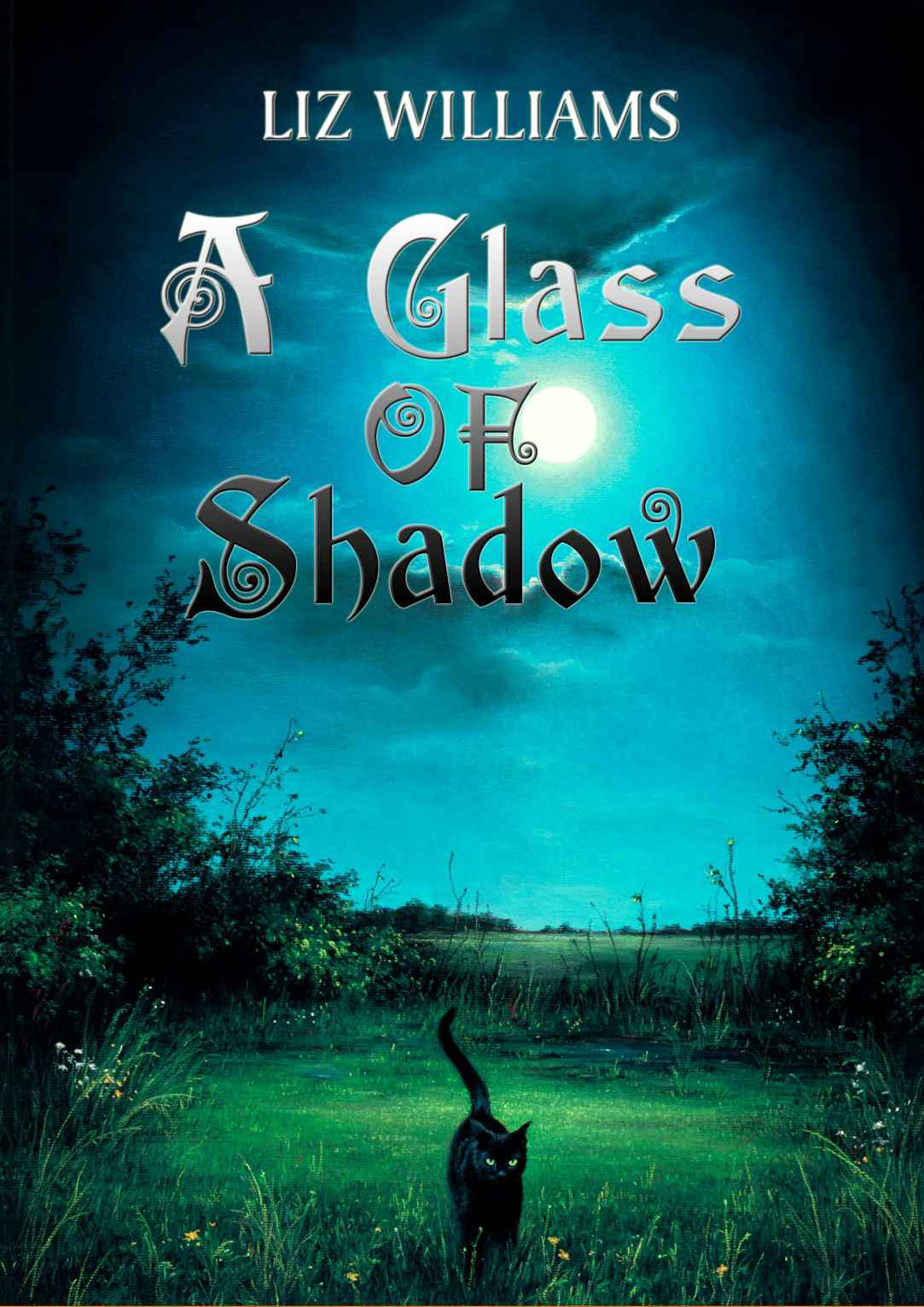 Liz Williams writes stories that fall into a variety of genres at once: science fiction, fantasy, mystery. I read–and fell in love with–her Detective Inspector Chen series, and so buy her anthologies, hoping that means she'll then be able to write more Chen stories.
Liz Williams writes stories that fall into a variety of genres at once: science fiction, fantasy, mystery. I read–and fell in love with–her Detective Inspector Chen series, and so buy her anthologies, hoping that means she'll then be able to write more Chen stories.
This volume is an anthology of her short stories, some set in the same worlds, some not. And as with all her anthology collections, some stories I loved, while others were good, but not my thing.
My problem with her stories is that I generally do not enjoy science fiction, so the more tech there is in a story, the less likely I am to enjoy that story. And these stories from the gamut from fantasy to science fiction to a little bit of everything.
The other problem, it's hard for me to recommend her stories, since they're not always easy reading, and they don't fit into any single category.
That's not to say I don't enjoy her stories, because of the most part, I do. But I find them hard to recommend, because they're difficult to classify.
Of course, for three dollars, it's most likely worth your time to try this collection to see if you like it.
Published by New Con Press
May 2012 | Rating: 6/10

